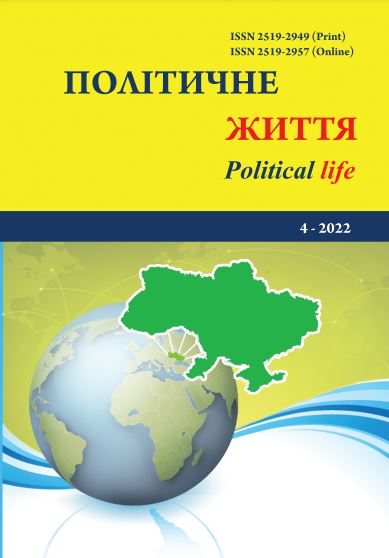The issue of Russia’s future in Ukrainian geopolitical teachings of the first half of the 20th century
DOI:
https://doi.org/10.31558/2519-2949.2022.4.16Keywords:
geopolitics; Russia; geopolitical directions of development; geopolitical interests; post-Russian worldAbstract
The article is devoted to the analysis of the coverage of the future of Russia in the geopolitical teachings of Ukrainian thinkers of the first half of the 20th century. This problem is actualized by the large-scale Russian aggression against the Ukrainian state and the need to outline the content of the Ukrainian victory in this war. The discourse in the circles of politicians and scientists regarding the future
of the "post-Russian world" received a powerful impulse after the statements of the American general Ben Hodges about the need to prepare for the division of Russia. It is noted that the Ukrainian political opinion of the first half of the 20th century considered the future of Russia and Ukrainian-Russian relations in the range from "coexistence" to participation in its "distribution". It is said that the views of one of the founders of the UРR, M. Hrushevskyi, have evolved from autonomism to the complete independence of Ukraine from Russia, the need to revive Ukraine’s natural geopolitical orientations. It is noted that S. Rudnytskyi, analyzing the political situation in Europe after the First World War and the interests and policies of the main European geopolitical actors, noted that most of them were focused on preserving Russia as a single large geopolitical space, which endangered not only the existence of Ukrainian an independent state, but also lasting peace on the continent and in the world. Attention is drawn to the fact that Yu. Bachynskyi, based on the Marxist methodology of analyzing the development of capitalism in Russia, concludes that it is divided into three separate political and economic mechanisms. It is emphasized that the most in-depth analysis of Russia’s prospects was made by Yu. Lуpa. Attention is drawn to the fact that the scientist considers the division of Russia not only inevitable, but also a component of Ukraine’s historical destiny. He believes that the return of the Muscovite state to its historical borders, provided that it renounces imperial ambitions, will contribute to the rapid well-being of the local population and the revival of moral values. Scientists pay special attention to the issue of the division of Siberia, which has an excellent population psychology and geopolitical directions of development.
References
Бен Годжес назвав три причини, через які може статися розвал Росії – останні новини. НВ.ua. URL: https://nv.ua/ukr/world/geopolitics/ben-godzhes-nazvav-tri-prichini-cherez-yaki-mozhe-statisya-rozval-rosiji-ostanni-novini-50269994.html
Розпад росії карта – які території може втратити рф після поразки у війні проти України. Слово і Діло (slovoidilo.ua). URL: https://www.slovoidilo.ua/2022/11/01/infografika/polityka/yaki-terytoriyi-ryzykuye-vtratyty-rosiya-pislya-porazky-vijni-proty-ukrayiny
Грушевский М.С. Освобождение России и украинский вопрос. СПб., 1907. 294 с.
Грушевський М. На порозі нової України: Гадки і мрії. К., 1991. 128 с.
Рудницький С. Українська справа зі становища політичної географії. Рудницький С. Чому ми хочемо самостійної України. Львів, 1994. C.93-208.
Бачинський Ю. Україна irredentа. Берлін, 1924. 237 с.
Бегей І. Юліан Бачинський: соціал-демократ і державник. К., 2001. 256 с.
Биковський Л. Публіцистика Юрія Липи. Розбудова Держави. Клівленд, 1955. Вип. 2 (17). – С. 115-121.
Липа Ю. Розподіл Росії. – Львів, 1995. 147 с.
Квітень М. Ідея “розподілу Росії” Юрія Липи. Центр досліджень правого руху. URL: https://web.archive.org/web/20130726150544/http://cdpr.org.ua/content/view/189/94/

